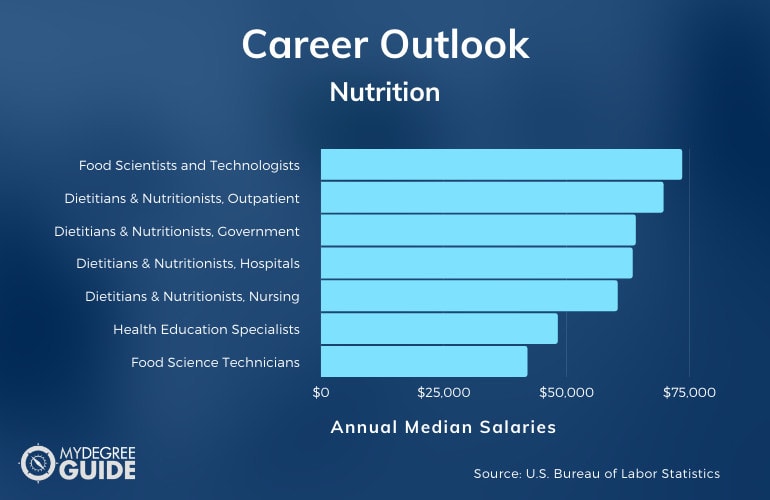If you’re interested in eating healthy and helping others do the same, then you may be wondering how to become a nutritionist.

Nutrition professionals can point people toward foods to fuel their bodies or to accommodate their unique dietary needs. It can be a fulfilling role that helps people maintain strong bodies and live healthy lives.
Editorial Listing ShortCode:
Earning a degree in nutrition could be the first step toward becoming a dietitian or a nutritionist.
How to Become a Nutritionist
Going to college for a bachelors degree in the field can be a strategic first step on the path to becoming a nutritionist. While not every nutrition position requires a college degree, a degree may provide the most opportunities for certifications and diverse job responsibilities.
Editorial Listing ShortCode:
Here’s an overview of what it generally takes to become a licensed nutrition expert:
- Pursue a bachelor’s degree. You can choose nutrition or another health-related field. If you want to become a registered dietitian (RD), it’s often necessary to attend a school that’s approved by the Accreditation Council for Education in Nutrition and Dietetics (ACEND).
- Complete an internship. Practical experience is a key component to qualifying for licensure. In a supervised internship setting, you can gain hands-on training that can help prepare you for the workforce. In order for your work hours to count as preparation for RD certification, your internship site should have ACEND accreditation.
- Take the RD exam. Once you’ve met the exam requirements, including a degree and an internship, you can sit for this standardized test. The Commission on Dietetic Registration administers the credentialing exam.
- Find a relevant job. Even after you’re approved as an RD, your state may require a set number of work hours in a supervised position before you can become licensed.
- Apply for licensure. Once you’ve met your state’s requirements, you can submit documentation to your state board and request nutritionist licensure.
- Earn a graduate degree. Additional advancement in this field is possible. You can get a masters degree or a doctorate in nutrition or dietetics. This can be an opportunity to explore a specialty area. There may be another internship involved in a graduate program.
- Become a Certified Nutrition Specialist (CNS). After earning a graduate degree and completing internship hours, you can take the exam to become a CNS. With this credential, you can provide personalized nutrition guidance and organize public health programs in nutrition.
- Maintain your credentials. Keeping your certifications and license active may require participating in regular continuing education courses.
The process of licensure can vary a good deal from one state to another, so it’s beneficial to consult your state board to discover how to become a dietitian or nutritionist.
Common Types of Nutritionists

Dietary professionals work in a wide variety of job settings, and they may focus on different tasks as well. Some of the most common types of nutritionists are clinical nutritionists, community nutritionists, and management dietitians.
1. Clinical Nutritionists
Clinical nutritionists work with patients who have specific health needs. For example, people might come to see a clinical nutritionist when heart disease, kidney failure, or another medical issue requires a dietary change.
Some clinical nutritionists specialize in a particular type of disorder, and others provide generalist services. They can work in many different settings, but hospitals, health clinics, and residential facilities are some of the most common.
2. Community Nutritionists

If you are interested in providing dietary education, then you might enjoy a career in community nutrition.
Professionals in this line of work often develop programs to communicate the importance of good nutrition. Some focus their efforts on specific populations, such as teens or mothers of young children.
Government agencies sometimes hire community nutritionists. Nonprofit clinics and insurance companies are other potential employers for this line of work.
3. Management Dietitians
If you want to lead a team of food service professionals or other nutritionists, you might consider a career as a management dietitian.
Editorial Listing ShortCode:
Management dietitians oversee food programs that provide nourishment for a large group of people. They have to balance people’s nutritional needs and the organization’s budgetary demands. This role is needed in schools, prisons, hospitals, residential facilities, and corporate cafeterias.
Nutrition Specialization Areas

Different people have different nutritional needs, so you can select a specialty area that will prepare you to work with a particular group. Some common nutrition specialization areas include:
- Gerontology: Specializing in geriatric nutrition can equip you to help elderly people meet their changing nutritional needs throughout the aging process.
- Oncology: As cancer patients go through treatment, oncology nutritionists advise them on meeting their nutritional needs and minimizing feeding-related side effects.
- Pediatrics: Children with various medical concerns can benefit from the care of a pediatric expert who understands the nutritional needs of growing young people.
- Renal Care: Specialists in this field are trained to help patients choose foods and drinks that support their kidney health.
- Sports: Experts in sports and fitness nutrition can help athletes choose the best eating plans to meet their medical needs and performance goals.
The Commission on Dietetic Registration offers board certification in these areas for nutrition professionals who meet their requirements.
Nutrition Careers & Salaries

Earning a degree in nutrition can allow you to pursue work in a variety of fields that involve studying foods or helping people achieve optimal health.
According to the Bureau of Labor Statistics, jobs for healthcare practitioners and technicians pay an average annual salary of $69,870.
| Careers | Annual Median Salaries |
| Food Scientists and Technologists | $73,450 |
| Dietitians and Nutritionists, Outpatient Care Centers | $69,660 |
| Dietitians and Nutritionists, Government | $64,010 |
| Dietitians and Nutritionists, Hospitals | $63,380 |
| Dietitians and Nutritionists, Nursing and Residential Care Facilities | $60,330 |
| Health Education Specialists and Community Health Workers | $48,140 |
| Agricultural and Food Science Technicians | $41,970 |
| Fitness Trainers and Instructors | $40,510 |
| Rehabilitation Counselors | $37,530 |
| Home Health and Personal Care Aides | $27,080 |
While these careers all relate to nutrition, some of them require additional training or certification beyond a bachelor’s degree in nutrition.
How to Know If a Degree in Nutrition Is Right for You

Becoming a nutritionist might be the right path for you if you’re passionate about spending your career helping others. It can also be a strategic choice if you’re interested in healthcare but don’t want to be a nurse or a doctor.
Characteristics that are beneficial in this field include:
- Analytical thinking
- Being a team player
- Commitment to research
- Desire to improve others’ wellbeing
- Effective oral and written communication
If you decide to become a dietitian, you’ll probably spend a lot of time working face to face with people. That may include patients as well as other healthcare professionals. Having strong people skills—in both speaking and listening—may contribute to your success.
Accreditation Council for Education in Nutrition and Dietetics (ACEND)

Undergraduate and graduate programs in this field can be approved by the Accreditation Council for Education in Nutrition and Dietetics (ACEND).
ACEND accreditation signifies that a college program meets industry standards and thoroughly prepares students for certifications and licensure in this field. In addition to approving college programs, ACEND also certifies internship sites, where you can receive hands-on nutrition training.
Editorial Listing ShortCode:
Some colleges with nutrition majors offer coordinated programs, in which an accredited internship experience is built into your college studies. In order to take the RD exam and become a registered dietitian nutritionist, it’s necessary for you to complete an ACEND accredited college program and an accredited internship.
What Is a Nutritionist?

A nutritionist is a healthcare professional who specializes in helping people meet their nutritional needs.
Nutritionists can partner with people to achieve their health and wellness goals. They might also come alongside people with medical concerns to help them find the right feeding solutions.
Depending on the state, the term “nutritionist” can encompass a variety of different professionals. Some states don’t regulate the use of this title, so nearly anyone can claim it. Other states require nutritionists to be nationally board-certified or licensed by the state.
What Does a Nutritionist Do?

Nutritionists help patients or clients meet their dietary needs and live healthy lives. Some people have health goals they want to achieve. They might want to lose weight or improve their fitness levels, and nutritionists can help. For example, sports nutritionists help athletes develop healthy eating plans for increasing muscle and boosting energy.
Other people face medical challenges that require special diets. Some clinical nutritionists specialize in meeting those needs. Some even focus on people with particular health concerns, such as cancer or kidney disease. Nutritionists can also oversee feeding programs. For example, they may run school, nursing home, or hospital cafeterias.
What Qualifications Do You Need to Be a Nutritionist?
The qualifications needed for a job in nutrition will depend on your state and career goals.
- Bachelor’s degree. An associate degree could lead to entry-level jobs, but most nutrition roles require a bachelor’s degree or higher.
- Registered Dietitian (RD). This widely recognized credential requires an ACEND accredited bachelor’s degree and a completed internship.
- Certified Nutrition Specialist (CNS). This nutrition credential, which prepares professionals to create personalized nutrition plans, requires a graduate degree and an internship.
- State licensure. In addition to earning certifications, you may also need to apply for licensure with your state board.
Increasing your education and certification can also lead to higher earning potential.
Where Can a Nutritionist Work?

Nutritionists work in a variety of job settings. Some are employed by nursing homes. Others work in health clinics or hospitals. In these healthcare facilities, they may oversee feeding programs or work with individual patients.
According to the Bureau of Labor Statistics, nutritionists and dietitians who work in hospitals earn a median annual salary of $63,380. Nutritionists may also play an important role in the cafeteria departments of schools, correctional facilities, corporations, or other organizations that feed large groups of people.
In residential care facilities, the median annual salary for nutritionists and dietitians is $60,330.
How Much Do Nutritionists Make?

According to the Bureau of Labor Statistics, most nutritionists and dietitians earn between $39,840 and $90,000 each year. The median salary for this job category is $63,090.
The highest salaries are often with outpatient care centers. Nutritionists and dietitians in this industry make a median salary of $69,660 each year. The second-highest wages are associated with government agencies. The median salary for nutritionists in government jobs is $64,010.
Editorial Listing ShortCode:
Working as a health education specialist can be another option for professionals with nutrition training. Health education specialists often earn between $33,720 and $101,890 annually.
What Degree Do You Need to Be a Nutritionist?
In some states, there’s no particular degree that you need to call yourself a nutritionist. You could get started with a certificate program or an associate degree.
No matter where you live, though, you can often get farther in this profession if you have at least a bachelors degree. With an ACEND accredited degree and around 1,000 internship hours, you can take the exam to become a registered dietitian (RD), also known as a registered dietitian nutritionist (RDN).
There are masters and doctoral degrees in this field, too. An advanced degree might help prepare you to become a Certified Nutrition Specialist (CNS).
What Can You Do with a Degree in Nutrition?

Professionals with nutrition degrees tend to work as dietitians or nutritionists. According to the Bureau of Labor Statistics, around 30% of people in this field work in hospitals.
Other nutritionists are employed by government agencies, outpatient care centers, and residential facilities. Some are self-employed. Health education is another field that some nutrition experts pursue. Nutrition education specialists may work for community organizations, government agencies, hospitals, or outpatient clinics.
A nutrition degree can also pair well with a fitness career. Many fitness instructors work for gyms or recreational centers. Fitness and nutrition coaching is another option for professionals who are interested in self-employment.
How Long Does It Take to Become a Nutritionist?

While a short certificate course might provide the basics in nutrition education, it’s usually advisable to invest more time before launching your nutrition career. A bachelor’s degree program in nutrition may take about 4 years.
To pursue certification or licensure, you’ll also complete a nutrition internship with around 900 to 1,200 hours of supervised work experience. The internship might be included in your degree program or completed afterward.
You could also choose to get a masters or a doctorate in nutrition and complete a graduate-level internship. Depending on the program, studies at the graduate level could take a year or more. For instance, doctoral programs typically take 3 to 5 years to complete with full-time study.
Is a Nutritionist a Doctor?

Nutritionists and doctors are two different types of healthcare professionals. Doctors provide preventive care and treatment for various health issues. Nutritionists focus on people’s dietary needs.
To become a medical doctor, a person must spend many years in school and receive a Doctor of Medicine degree. Nutritionists often have at least a bachelor’s degree in their field, and they may need to be licensed as well.
Most doctors receive limited training on nutrition-related topics, so nutritionists play a valuable and complementary role in the healthcare field.
What’s the Difference Between a Dietitian vs. Nutritionist?
Two different titles in the nutrition world are dietitian and nutritionist. These are distinct professional categories, so it can be helpful to familiarize yourself with the general differences.
| Dietitians | Nutritionists |
|
|
Different states can classify dietitians and nutritionists in different ways, so the above guidelines may not fully hold true in all parts of the country.
Is Becoming a Nutritionist Worth It?
Yes, becoming a nutritionist is worth it for many students. Working in healthcare can be a fulfilling way to improve other people’s quality of life. Nutrition is a growing field, too. The Bureau of Labor Statistics estimates that jobs for dietitians and nutritionists will grow 8% over the next decade.
A nutritionist degree may also lead to job versatility. You could consider working in dietetics, fitness, or health education. This degree could also complement a career in rehabilitation counseling or food science.
Getting Your Degree in Nutrition Online

If you’re passionate about healthy eating that supports the body, then you might consider earning a college degree in nutrition. Not only would you study general nutrition principles, but you could prepare for a field that contributes to others’ quality of life.
You could also choose to specialize in helping people with particular medical needs or fitness goals. When you’re ready to get started on a nutrition degree, you may want to consider the flexibility of online schooling. There are even nutrition degree online programs that are accredited by ACEND. This includes both bachelors and masters in nutrition online.
You can start checking out accredited online nutrition programs today to find the one that best fits your personal preferences and professional goals.

